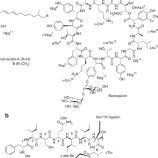
Articles
-
Mar 25, 2025 |
nature.com | Abdulrahman D. Ibrahim |Zihao Liang |Hafiza Kashaf Tariq |Rong Li |Xuechen Chen |Shu Xu | +6 more
Despite the success of cancer immunotherapy in treating hematologic malignancies, their efficacy in solid tumors remains limited due to the immunosuppressive tumor microenvironment (TME), which is mainly formed by myeloid-derived suppressor cells (MDSCs). MDSCs not only exert potent immunosuppressive effects that hinder the success of immune checkpoint inhibitors (ICIs) and adaptive cellular therapies, but they also promote tumor advancement through non-immunological pathways, including promoting angiogenesis, driving epithelial-mesenchymal transition (EMT), and contributing to the establishment of pre-metastatic environments. While targeting MDSCs alone or in combination with conventional therapies has shown limited success, emerging evidence suggests that MDSC checkpoint blockade in combination with other immunotherapies holds great promise in overcoming both immunological and non-immunological barriers. In this review, we discussed the dual roles of MDSCs, with a particular emphasis on their underexplored checkpoints blockade strategies. We discussed the rationale behind combination strategies, their potential advantages in overcoming MDSC-mediated immunosuppression, and the challenges associated with their development. Additionally, we highlight future research directions aimed at optimizing combination immunotherapies to enhance cancer therapeutic effectiveness, particularly in solid tumor therapies where MDSCs are highly prevalent.
-
Nov 9, 2023 |
nature.com | Thomas Sellers Jr. |David Hunter |Ian Thompson |Robert Hamilton |Ana Francisca Vega |Eric A. Klein | +98 more
The transferability and clinical value of genetic risk scores (GRSs) across populations remain limited due to an imbalance in genetic studies across ancestrally diverse populations. Here we conducted a multi-ancestry genome-wide association study of 156,319 prostate cancer cases and 788,443 controls of European, African, Asian and Hispanic men, reflecting a 57% increase in the number of non-European cases over previous prostate cancer genome-wide association studies. We identified 187 novel risk variants for prostate cancer, increasing the total number of risk variants to 451. An externally replicated multi-ancestry GRS was associated with risk that ranged from 1.8 (per standard deviation) in African ancestry men to 2.2 in European ancestry men. The GRS was associated with a greater risk of aggressive versus non-aggressive disease in men of African ancestry (P = 0.03). Our study presents novel prostate cancer susceptibility loci and a GRS with effective risk stratification across ancestry groups. A multi-ancestry genome-wide association study of prostate cancer performed in 156,319 cases and 788,443 controls identifies 187 novel risk variants associated with the disease. Genetic risk scores associated with overall risk, and risk of aggressive disease in men of African ancestry.
Try JournoFinder For Free
Search and contact over 1M+ journalist profiles, browse 100M+ articles, and unlock powerful PR tools.
Start Your 7-Day Free Trial →